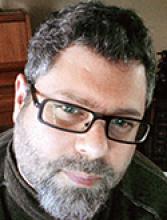There is no one-size-fits-all formula for attuning oneself to the Holy Spirit. We are all wired differently. This means we will often have to take different approaches to spiritual growth and engage in different spiritual practices than our fellow believers. This is a difficult thing to do, to go against the grain and norms of one’s church, but it is completely necessary for many of us. It requires courage and a desire to experience God more than maintaining one’s reputation or the church’s equilibrium.
One of the healthiest things a church can do, in my opinion, is create an ethos that celebrates diversity and routinely names the reality that we are all unique human beings with unique relationships with God, and therefore we connect with God in different ways. Many churches do this to a degree, but the freedom they provide lies within certain—and often unspoken—parameters.
Some of those parameters might be necessary and good, but they ought to be continually evaluated by the whole community. A good indication that the whole community is truly involved in this process will be the regular expansion of those parameters.
There are many factors that shape how a person connects with God, such as one’s personality type, spirituality type, theological orientation, life stage and spiritual development stage. Even church communities that appear to be highly homogenous are made up of human beings who are regularly bumping into other people, information and circumstances that invite—or threaten—them to be stretched, grow and change. The most prominent influence routinely motivating us to be transformed is God!
The way I relate to God today is very different than how I related to God five years ago and how I related to God five years ago was different than five years earlier. This is a sign of movement, progress and maturity, if accompanied by increasing yields of the fruits of the Spirit. Awareness of this progression also produces humility about my current beliefs and practices. I realize there is a good chance I will again be communing with God differently in five years from now.
With this in mind, I am able to hold my current beliefs, assumptions and expectations a little less tightly. I am more prepared to let go because I have learned that letting go is essential to the growth cycle. If I’m convinced of anything, it is this: a spirit of gelassenheit, or a willingness to let go, is paramount to spiritual growth.
In my early 20s I tried to convince everyone to doubt like I did, critique and question the Christian faith as I did, and use the same kind of reasoning I did. I was convinced I was right and that everyone needed to “see the light,” as I had.
In my early 30s, on the other hand, I tried to persuade everyone to pray the way I prayed, believe what I believed and serve the way I served. Once again, I meant well. I was experiencing God so powerfully through my practices and beliefs current at the time, I just wanted others to experience God too.
What I didn’t fully appreciate at the time was that different kinds of people connect with God differently. I had not yet realized that what was helping me experience God wasn’t necessarily going to help others connect with God. I also had not fully grasped another important truth. Namely, one needs to take different approaches to spiritual growth during different seasons of one’s faith journey. It took a “dark night of the soul” for me to really understand this. (More on that in another article.)
What I am slowly learning to do as a pastor and spiritual guide is to fan the flame of desire for God in others. As the saying goes, “You can lead a horse to water, but you can’t make it drink.” Until people experience a thirst and longing for the divine, nothing I share with them about how to connect with God is going to matter.
Antoine de Saint-Exupéry said: “If you want to build a ship, don’t drum up the men to gather wood, divide the work and give orders. Instead, teach them to yearn for the vast and endless sea.”
For too long I mistook pastoral ministry to mean doling out biblical instructions and giving orders on how to grow spiritually. It doesn’t work.
Troy Watson (troydw@gmail.com) is spiritual life director of the Quest Community in St. Catharines, Ont.
--Posted Jan.29, 2014
See also:
Part 1 (Sept. 30. 2013 issue)
Part 2 (Oct. 28, 2013 issue)
Part 3 (Nov. 25, 2013 issue)
Part 4 (Jan. 6, 2014 issue)
Part 6 (March 3, 2014 issue)



Add new comment
Canadian Mennonite invites comments and encourages constructive discussion about our content. Actual full names (first and last) are required. Comments are moderated and may be edited. They will not appear online until approved and will be posted during business hours. Some comments may be reproduced in print.